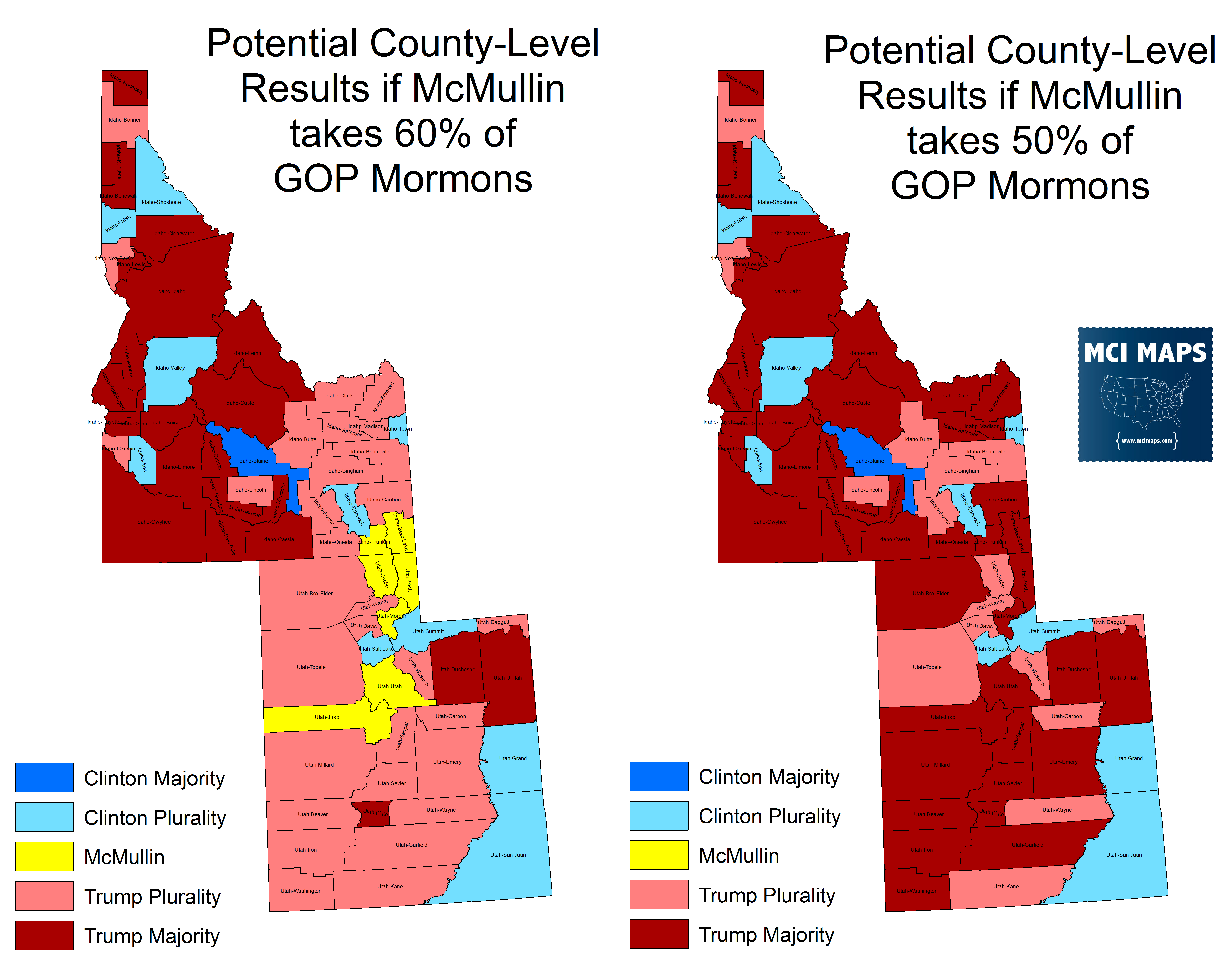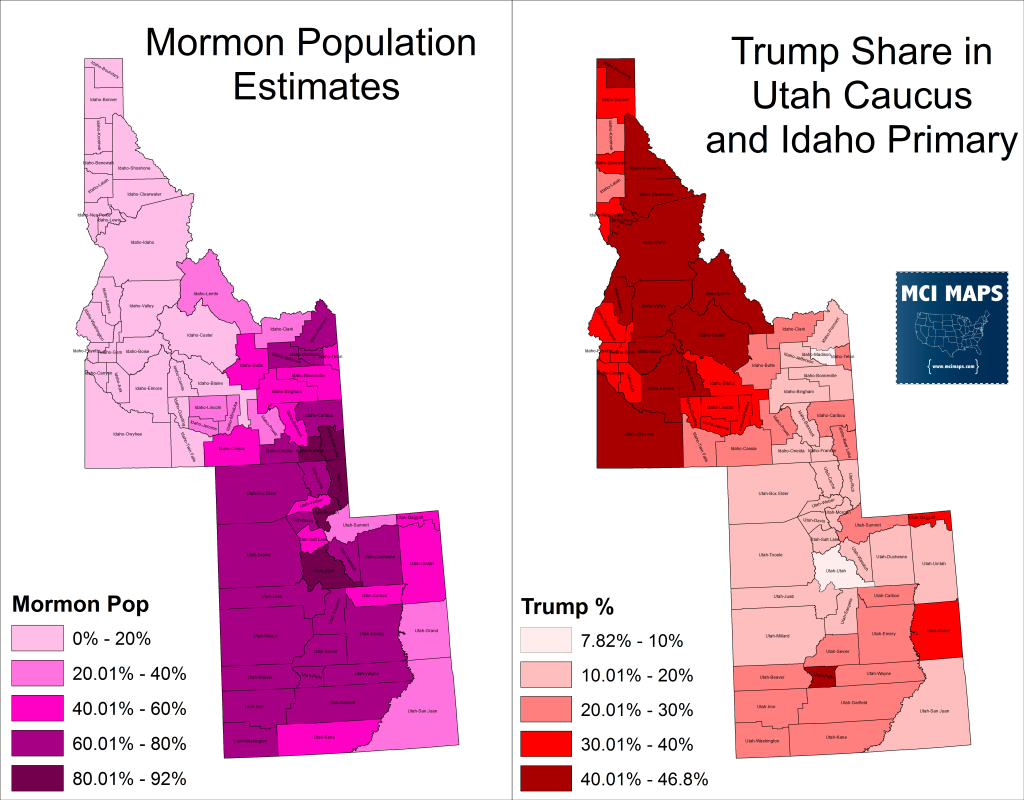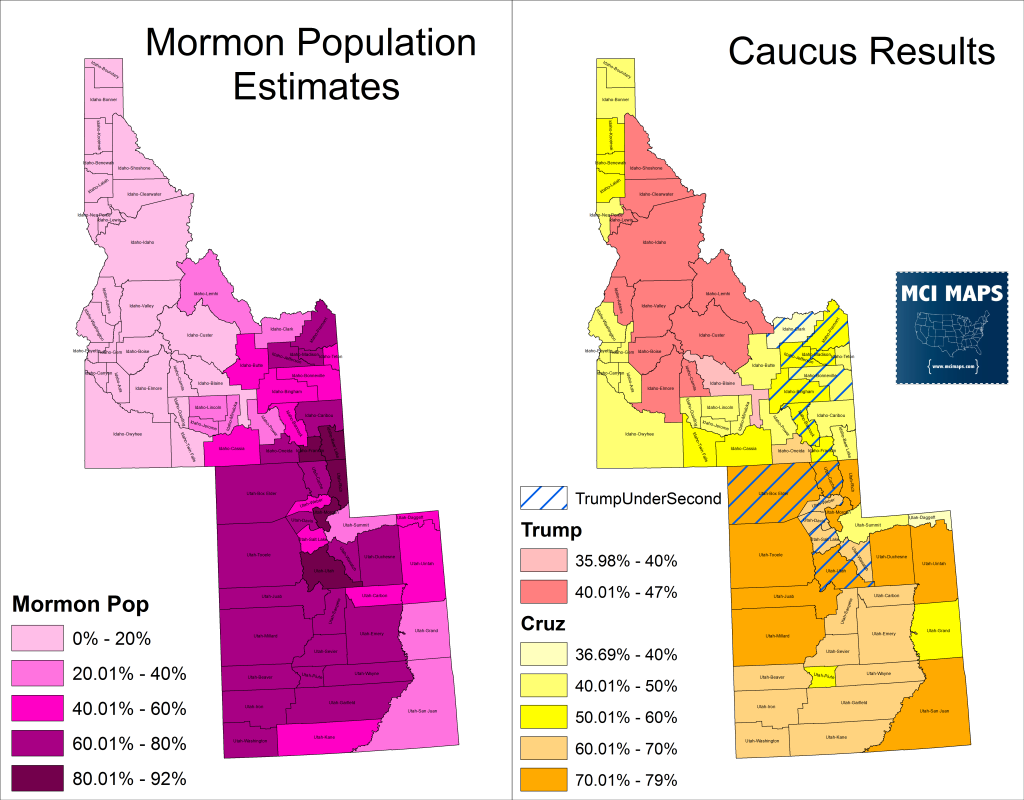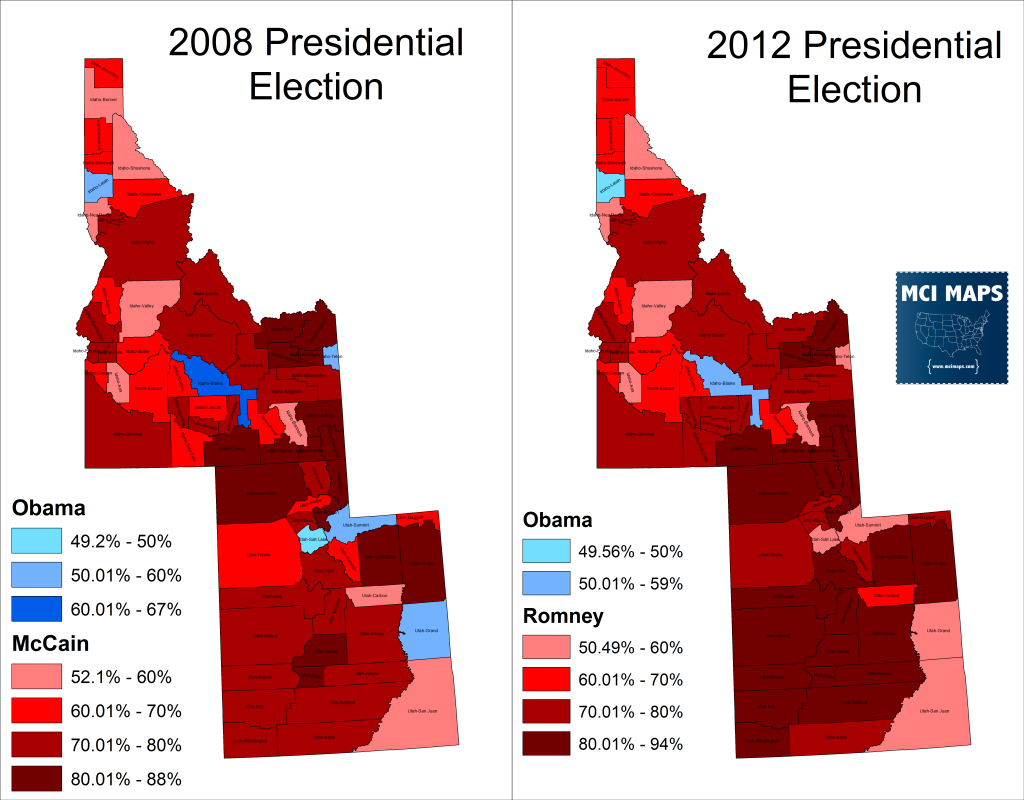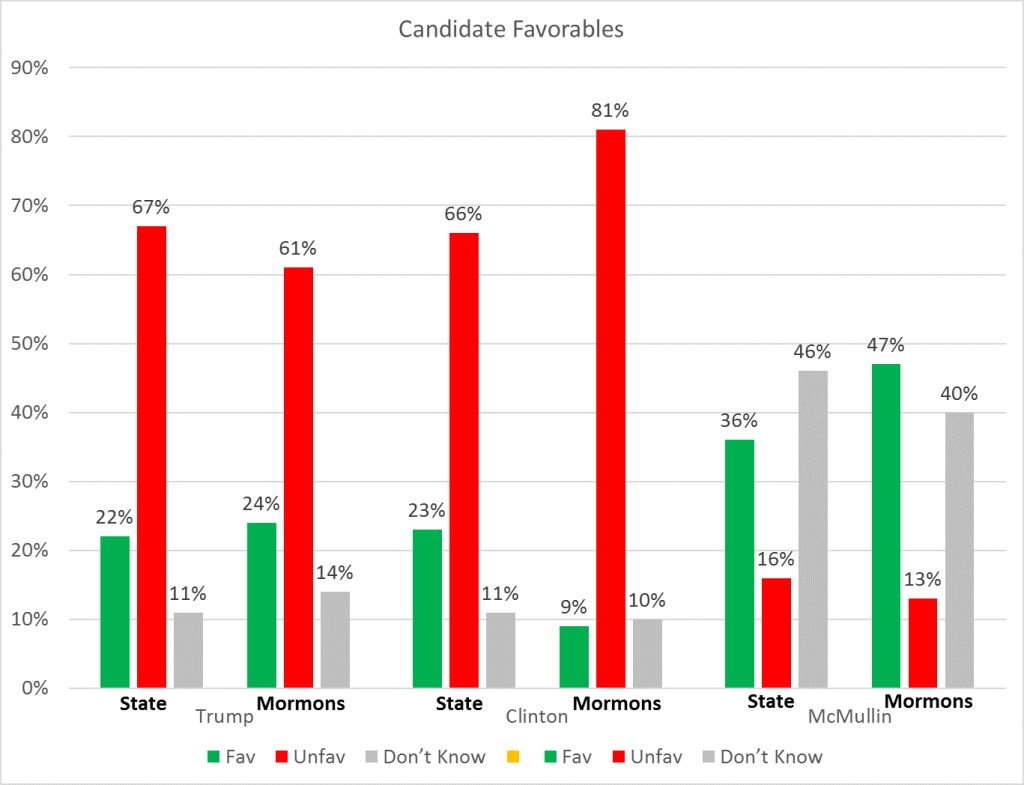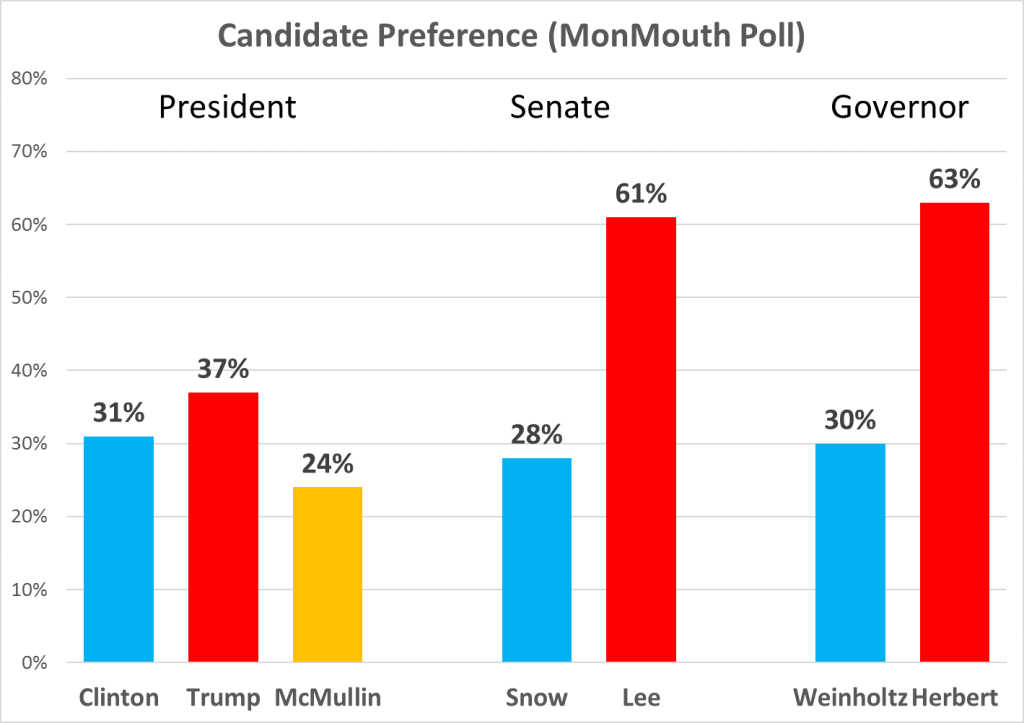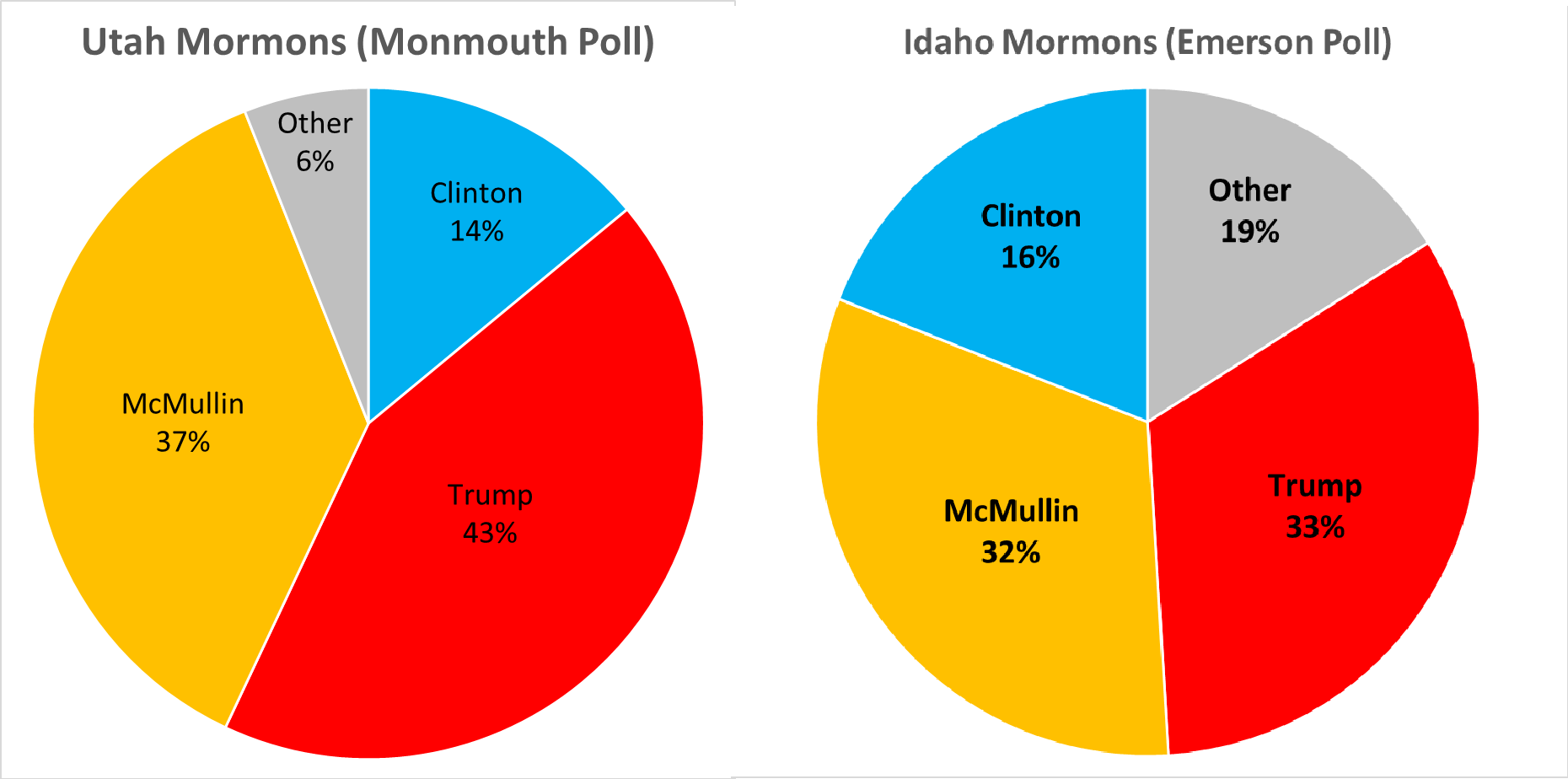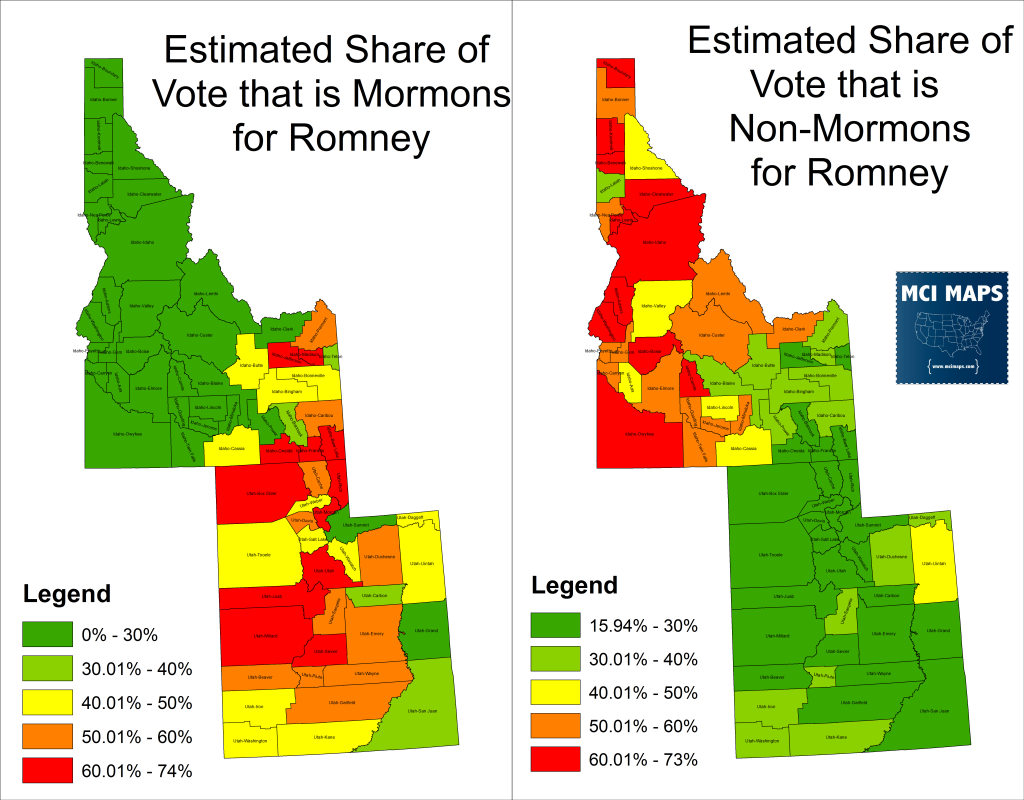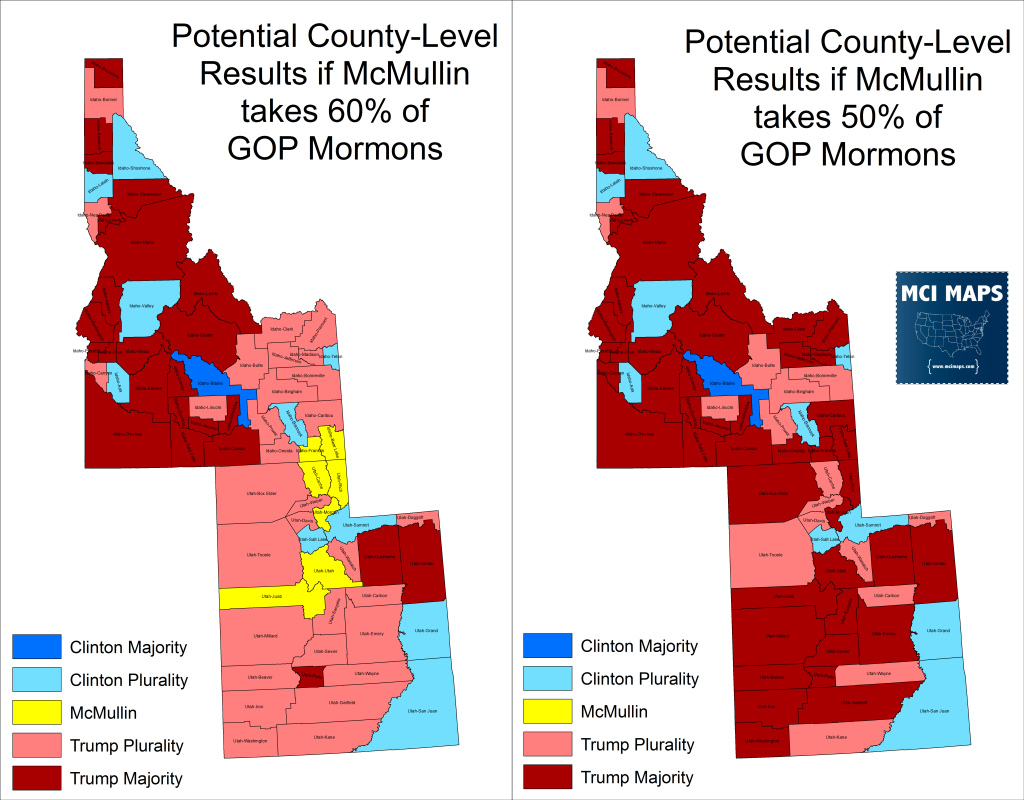Donald Trump has problems with many different blocks if voters. He is a bogyman to Hispanics, despised by African-Americans, and off-putting to college educated and suburban whites. However, to me the most fascinating of Trump’s problems is with Mormon Americans, a group that is traditional one of the strongest for the GOP, but this time remains very much in up in the air. There has been plenty written about why Trump is so unpopular with Mormons. His vulgar nature and lifestyle certainly earn him few supporters. However, a bigger factor is his demonizing of Muslims and anti-immigrant sentiment. Mormons have shown to be more pro-immigration and weary of candidates that demonize groups of people. This stems from Mormon mission trips abroad and their own history with being persecuted. The result has been a major voting block in Utah and Idaho holding sky-high disapprovals of the GOP nominee, putting at least one of these states into a weird state of play.
Mormon in the Western Primaries
Trump’s problems with Mormon voters stretch back into the primary season. While Trump managed to do respectably with evangelicals in other states, especially in the South, he ran into a major roadblock in the West. Ted Cruz crushed Trump in the Utah caucuses. Cruz got 69% in Utah, with Kasich at 16% and Trump in third with 14%. A few weeks earlier, in the Idaho Primary, Trump lost to Cruz 45-28%. Utah is over 60% Mormon, while Idaho is a solid 25%. With around 80% of Mormons leaning Republicans, the GOP caucus/primaries in these states were no doubt more Mormon than average. Exact religious figures are always tricky to come by. However, I was able to track down Mormon estimates by county for Utah and Idaho. Looking at the Mormon estimates by county and Trump’s share of the vote in the Utah/Idaho contests, it’s clear Trump had a serious Mormon problem in the primaries.
Trump did best in Western Idaho, where few Mormon reside. Meanwhile, he failed to clear 20% in most heavily-Mormon counties and didn’t even crack 10% in Utah County, home to Brigham Young University.
Looking at the Mormon population next to the complete results of the Idaho/Caucus contests, Trump’s only wins were in counties with smaller Mormon populations. Trump also fell into 3rd in many heavily-Mormon counties.
Someone who has not seen recent polling in Utah may be thinking “ok so they don’t like him. But Mormon’s are super Republican, so they will still vote for the GOP nominee right?” Well you are right about one thing, Mormon’s are very Republican. Mitt Romney received around 80% of the Mormon vote in 2012, as did George W Bush in 2004. Both Idaho and Utah were solidly Republican in 2012 and 2008.
While Obama managed to snag a few counties out of Utah in 2008, amid a blue wave, he still couldn’t crack 35%. In 2008, Obama clawed his way to 36% in Idaho.
The bottom line is, Utah and Idaho are too conservative to vote Clinton over Trump. While Mormon voters may not like Trump, their conservative ideology will only bend so far, so Utah/Idaho continued their tradition of being effectively ignored in the general election through the spring and summer.
Then Evan McMullin came along.
A Mormon Alternative
Evan McMullin announced is presidential candidacy months before anyone really took notice. McMullin was a former CIA operations manager and House GOP staffer. His ideology is similar to George W Bush and he represents a more standard establishment conservative. McMullin ran to give establishment conservatives and alternative option. However, with little name ID or money McMullin’s candidacy has not taken off across much of the nation. McMullin got in late and only managed to get on the ballot in 11 states. However, two of those were Idaho and Utah. McMullin himself is Mormon and went to Brigham Young University. It seemed that if McMullin was going to have any real impact, it would be in Utah and Eastern Idaho.
Still for some time, McMullin’s candidacy wasn’t factored in. He wasn’t included in polls for Utah, despite polls showing a large undecided vote. When McMullin finally started getting included in polls around September, he was polling in the 20s. Controversy with Trump over the Access Hollywood tape and his poor debate performance further boosted McMullin, who began to make Utah is main focus. An Emerson poll in mid-October even had McMullin leading in Utah with 31%. In the pollster averages, McMullin still hovered in 3rd, neck and neck with Clinton for 2nd. On the 538 podcast, Nate Silver said his model could be underestimating McMullin, and the way pollsters included McMullin their surveys could effect the results. The 538 polls-only model projects McMullin in 2nd place with Trump getting less than 40%.
Unfortunately for McMullin, his growth seems to have flat-lined. A new Emerson poll puts Trump back in the lead, and McMullin has not moved past 30% in the pollsters’ averages. McMullin hasn’t really lost ground, but he hasn’t gained enough to pull ahead permanently. The Trump campaign has taken the threat seriously though, as Mike Pence was dispatched to Utah to sure up conservatives there. A white nationalist group also sent out a robo call in Utah accusing McMullin of being gay.
McMullin’s rough path to a 1st place in Utah is twofold. First, McMullin is not winning the Mormon vote. The recent Monmouth poll in Utah showed McMullin getting 37% of Mormons to Trumps 43%, with Clinton getting 14%. Among non-Mormons (which would include liberals and conservative evangelicals that are not Mormon), McMullin only gets 7%. Conservatives in general back Trump. It is Mormons specifically that McMullin has strength with. However, if McMullin is narrowly trailing Trump with Mormons, then he can’t win Utah. McMullin would need a solid Mormon win in order to combat Trump’s strength with non-Mormon conservatives.
To be clear, Trump has not really improved his standing with Mormon’s. In Utah, Trump has a 67% disapproval statewide, 61% with Mormons. However, Clinton stands at an 81% Mormon disapproval, making her even less liked than Trump. McMullin is the only candidate to sport a net-favorable with Mormons, but over 40% don’t know enough to form an opinion. This is McMullin’s biggest problem, he is out of time and money to move those undecideds into the favorable column.
Trump’s weakness with Mormons is poised to result in him getting a dramatically lower share of the vote than other Republicans on the ballot. The Monmouth poll gave him 37% of the vote, while Senator Lee and Governor Herbert are both over 60%.
Clinton’s vote share is roughly the same as the Democratic candidates for Senate and Governor. The Democratic vote remains fairly united in Utah. It is hard to see Clinton doing much better than the low 30s. McMullin’s candidacy, taking away Mormons that are otherwise backing Lee and Herbert, is what keeps Trump below the 40s. Trump has a big Mormon problem, but it just might not be big enough to stop him from winning such a conservative state.
Where Can McMullin Do Best?
Let’s say McMullin can’t win Utah. Can he win some counties? If he does, he will be the first third-party candidate to win a county since Ross Perot.
The best counties for McMullin will undoubtedly be those with the largest Mormon population. McMullin’s weakness with non-Mormons make any county without a large Mormon base likely out of range. McMullin would then need to win a majority of Mormons in specific counties to get onto the map. The Utah Monmouth poll has Trump narrowly leading McMullin with Mormons that plan to vote GOP, while a recent Idaho poll by Emerson has Trump and McMullin tied among GOP-leaning Mormons.
In Idaho, McMullin’s tie with Mormon’s is translating into 10% of the vote. The Mormon vote is too small to allow a McMullin upset win (or even a 2nd place finish). However, McMullin could take some Idaho Counties if he wins the undecided Mormons in the state.
To get a feel for how counties could break in the election, let’s look at the voting dynamics in Utah and Idaho by county, specifically the counties with the highest share of GOP-backing Mormons.
When Romney ran in 2012, he got 80% of the Mormon vote. As stated before, this was similar to George W Bush’s share, so it was not just a symptom of Romney being Mormon himself. Mormon’s have long been a solid GOP voting bloc. In Idaho and Utah, there are effectively three key voting blocs, Mormons that vote GOP, GOP voters that are not Mormon, and the Democratic vote (including the Dem-leaning Mormons). For the purposes of this analysis, I am just going to assume Clinton will get the same share of the vote Obama got in 2012 (which was lower than his 2008 share). She could fall, but she is polling ahead of Obama’s 2012 share. So if anything I’m being conservative. I then took the estimated Mormon share of each county, and assuming Romney got 80% of Mormons in each county (imperfect, I know), calculated the share of the vote that was Mormons for Romney, then the share of the vote that was non-Mormons for Romney (with the remaining being Obama/other).
The maps below show the share of the vote in each county that was Mormons for Romney and non-Mormons for Romney.
The maps conform with what we have seen already. Western Idaho is very conservative but not very Mormon, meanwhile most of Utah and Eastern Idaho are where Mormons who backed Romney. Only a few counties in both states didn’t have high shares of Romney backers (gave decent shares to Obama), and are green on both maps.
For McMullin, counties where the electorate is largely non-Mormons that voted Romney are not really in play for him. McMullin’s best chance is the counties made up of 60% or more Romney-backing Mormons.
I ran some numbers and have two scenarios. One scenario is McMullin manages to get to 50% of Romney-backing Mormons. The other scenario is where McMullin gets to 60% of GOP-backing Mormons. In both scenarios I have Clinton getting Obama’s % from 2012, and Trump getting 80% of the non-Mormon vote that Romney got.
If McMullin gets 60% of GOP-Mormons in Utah and Idaho, he will net several counties. However, if he only manages a tie, he gets none. Clinton will likely win more counties than Obama thanks to the GOP split.
At this point, unless the polling is off, McMullin getting 60% of GOP-Mormons is not likely. However, he could get 60% in specific counties. If I had to bet on one county McMullin has a real shot at winning, it would be Utah County, where McMullin went to school and Trump got 9% in the Utah Caucuses.
McMullin may or may not make it onto the map in Utah or Idaho. Either way, he is poised to have a strong 3rd party showing. The results out of Utah and eastern Idaho will no doubt be analyzed and debated. The sheer fact that we are even discussing these normally solid-GOP states shows that for some groups, Trumpism is a bridge to far.

